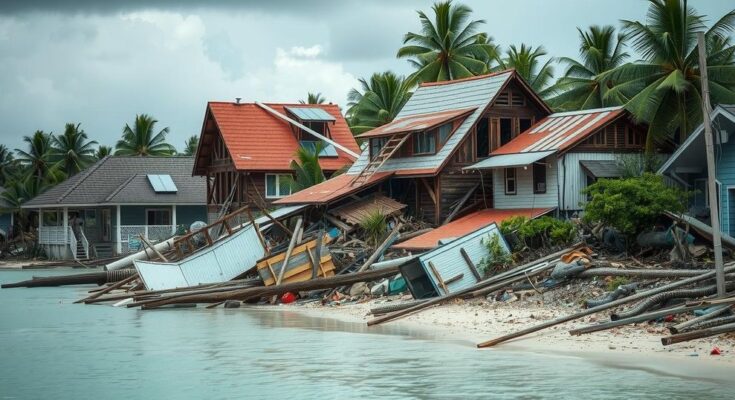Cyclone Chido has caused significant devastation in Mayotte, resulting in at least 11 fatalities and extensive injuries. The storm brought destructive winds exceeding 220 kph and has now moved to Mozambique, where it threatens millions. Historical patterns indicate a troubling increase in cyclone severity in the region, emphasizing the need for effective disaster preparedness.
Cyclone Chido has wreaked havoc in Mayotte, a French territory located in the Indian Ocean, resulting in the loss of at least 11 lives, as reported by the Interior Ministry of France on Sunday. The extent of the damage has complicated efforts to ascertain the total casualties, with fears that the numbers may rise. Hospitals have indicated that nine individuals are in critical condition, while a total of 246 others have sustained injuries due to the severe storm.
The cyclone, which made landfall with wind speeds exceeding 220 kilometers per hour, significantly impacted not only Mayotte but also nearby islands including Comoros and Madagascar. Officials described the disaster as the worst cyclone to hit Mayotte in 90 years, with widespread destruction reported across the island. The prefect of Mayotte confirmed that entire neighborhoods have been obliterated, trees uprooted, and boats damaged beyond repair. The local airport has also suffered considerable damage, further complicating relief efforts.
As the cyclone has continued its path across the Indian Ocean, it has now made landfall in Mozambique, where emergency officials have raised concerns that 2.5 million individuals in two northern provinces could be affected. With potential threats of flooding, neighboring countries Malawi and Zimbabwe are actively preparing for possible evacuations from low-lying areas, reiterating the necessity of readiness in anticipation of severe weather events.
This frequent occurrence of powerful cyclones in the region underscores the increasing vulnerability of areas like Mayotte, which has historically faced challenges associated with underinvestment and drought conditions. Cyclone Idai in 2019 serves as a stark reminder of the devastating impact such storms can have, having resulted in over 1,500 fatalities across Mozambique, Malawi, and Zimbabwe.
Cyclone Chido is part of a troubling trend of increasingly severe weather events in the southeastern Indian Ocean. The region has been hit by a series of intense cyclones in recent years, raising alarms about climate change and its consequences on vulnerable areas. Mayotte, characterized as France’s poorest island, has dealt with a lack of resources to combat natural disasters effectively, making it particularly susceptible to the impacts of severe weather. The ongoing situation highlights the need for improved infrastructure and emergency preparedness in regions prone to cyclonic activity. Historical data indicates that climate patterns in this region have shifted, leading to more frequent and stronger storms, warranting a comprehensive response strategy from local and international agencies.
In summary, Cyclone Chido has resulted in significant loss of life and extensive damage in Mayotte, marking yet another severe weather event with devastating consequences for the region. The cyclone’s progression into Mozambique and the potential threats to neighboring countries underscore the far-reaching impacts of such disasters. Preparedness and resilience have become critical in the face of increasing cyclonic activity, necessitating both immediate and long-term strategies to protect vulnerable communities in the Indian Ocean region.
Original Source: www.business-standard.com




